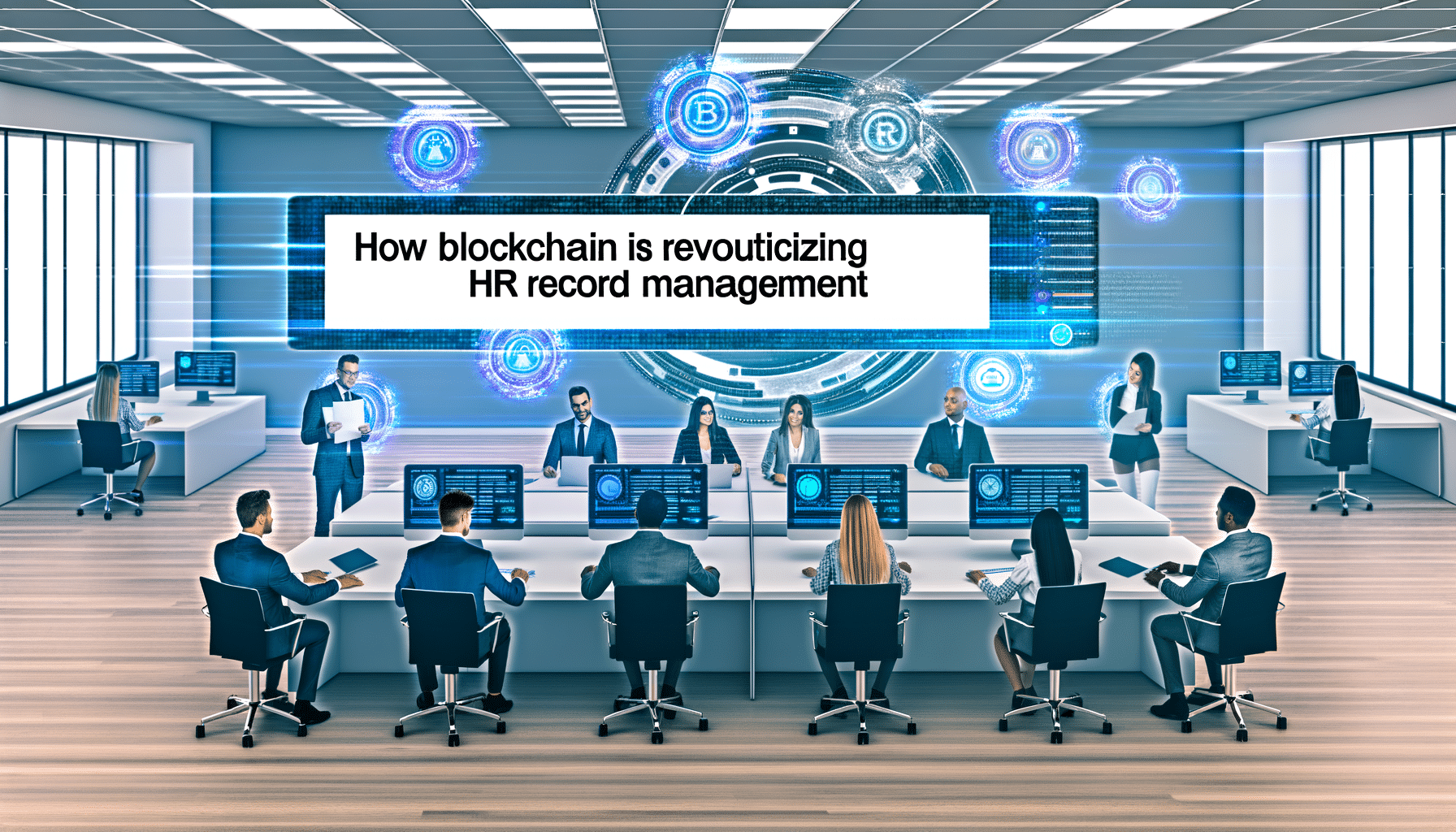- EHR Management
- February 21, 2023
How Blockchain is Revolutionizing HR Record Management

As someone deeply entrenched in the fast-paced world of technology, I have witnessed firsthand the seismic waves of innovation that blockchain is currently sending across various sectors. One particularly fascinating application lies in human resources (HR) record management. Blockchain, often synonymous with cryptocurrency, is much more than that; it’s a secure and transparent digital ledger capable of transforming how industries handle data, particularly HR which is data-heavy and incredibly dynamic.
The Challenge of Traditional HR Record Management
Before diving into the potential that blockchain offers, let’s first address the traditional landscape of HR record management. HR professionals grapple with a mountain of paperwork—employee contracts, payroll data, benefits, performance reviews, and more. It’s not just about storing this data; it’s about ensuring it’s both secure and accessible. Unfortunately, traditional methods often fall short, leading to inefficiencies, errors, and even compliance risks.
The cumbersome nature of traditional systems means that HR teams spend a disproportionate amount of their time on administrative tasks. This leaves little room for what truly matters—nurturing talent, building company culture, and supporting strategic decisions.
Blockchain: A Game-Changer for HR Record Management
Enter blockchain technology: a mechanism with the potential to not only remedy these challenges but to revolutionize the entire approach to HR record management. The core attributes of blockchain—immutability, transparency, and decentralization—are what make it such a compelling solution.
Enhanced Security and Privacy
One of the most significant advantages blockchain offers is enhanced security. Each record added to the blockchain is encrypted and immutable, meaning once it’s recorded, it cannot be altered without consensus within the network. This drastically reduces the risk of data breaches, a growing concern for HR departments handling sensitive employee information.
Streamlining Verification Processes
I often hear from HR leaders about the challenges they face in verifying employee records. Blockchain can offer a decentralized, tamper-proof solution for verifying qualifications, experience, and identities. By leveraging smart contracts, HR departments can automatically validate these records with other parties, such as educational institutions or previous employers, saving time and reducing errors.
Efficient Record Keeping and Retrieval
The immutability and transparency of blockchain allow HR professionals to maintain efficient and organized records, which can be easily accessed and tracked. This functionality becomes highly beneficial during audits or when there is a need to comply with regulations like GDPR. Blockchain provides verifiable proof of compliance at any point in time without the need for laborious paper trails.
Real-World Blockchain Application in HR
While the benefits of adopting blockchain technology are clear, practical implementation can seem daunting. However, several companies have already jumped aboard the blockchain train with encouraging results. For instance, Workday, a leading enterprise cloud application provider for finance and HR, has integrated blockchain to offer verified skills and credentials in their applications.
Businesses adopting blockchain for HR can expect not only enhanced security and efficiency but also improved trust between employees and management, as data becomes more transparent and accountable.
The Future of HR with Blockchain
As we look ahead, the potential for blockchain within HR expands not just to current records or verifications but to a broader spectrum including talent acquisition and payroll processing. Blockchain could revolutionize the pay equity process, facilitating real-time payroll with cryptocurrency or tokens, especially in multinational corporations dealing with varied currencies.
Building Trust through Transparency
In the era of data protection and privacy concerns, employee trust in how their data is managed is paramount. Blockchain’s transparency allows employees to see who has accessed their data and why, fostering a culture of transparency and trust, which is invaluable in today’s competitive job market.
Embracing the Revolution with RecordsKeeper.AI
At RecordsKeeper.AI, we’re excited to be part of this revolution by integrating blockchain technology into our record management systems. By automating categorization, securing sensitive information, and ensuring compliance seamlessly, we bridge the gap between traditional HR systems and future-ready solutions.
Are you ready to transform your HR record-keeping with blockchain? Let’s embrace innovation and turn HR record management from a daunting task into a strategic advantage.
For more insights on how blockchain can benefit your business, keep following my journey as we explore the impactful intersections of technology and operations.
Toshendra Sharma is the visionary founder and CEO of RecordsKeeper.AI, spearheading the fusion of AI and blockchain to redefine enterprise record management. With a groundbreaking approach to solving complex business challenges, Toshendra combines deep expertise in blockchain and artificial intelligence with an acute understanding of enterprise compliance and security needs.
Related Posts

Best Practices for Securing Electronic Health Records (EHR)
Learn effective strategies to secure electronic health records in healthcare institutions.
- November 20, 2023
Archives
- January 2025
- December 2024
- November 2024
- October 2024
- September 2024
- August 2024
- July 2024
- June 2024
- May 2024
- April 2024
- March 2024
- February 2024
- January 2024
- December 2023
- November 2023
- October 2023
- September 2023
- August 2023
- July 2023
- June 2023
- May 2023
- April 2023
- March 2023
- February 2023
- January 2023
- December 2022
- November 2022
- October 2022
- September 2022
Want to get more content like this?
Signup to directly get this type of content to your inbox!!
Latest Post
Document Control for Equipment Maintenance
- January 20, 2025
Managing Records for Multiple Clients
- January 19, 2025
Handling Conference Documentation
- January 18, 2025
Setting Up Department Record Reviews
- January 17, 2025





